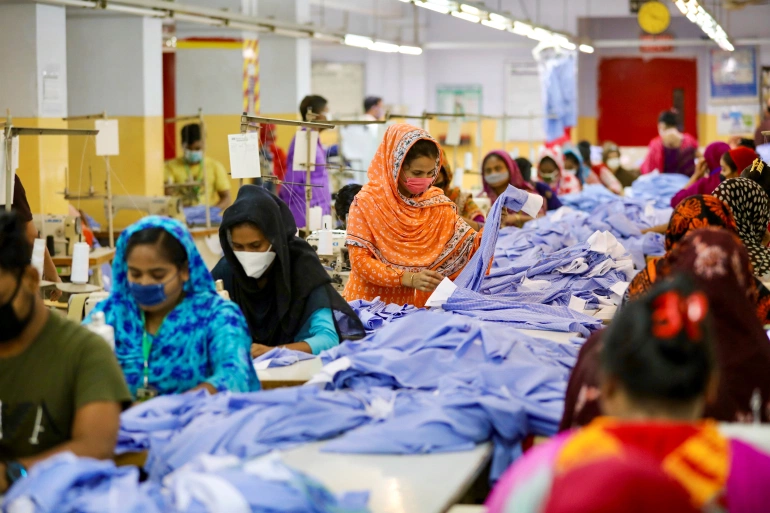Fashion victims: Garment personnel risk losing jobs during the crisis

Image: Collected
Millions of garment personnel could lose their jobs as global brands are demanding price cuts and delaying payments to suppliers who are desperate for orders to survive the brand new coronavirus pandemic, researchers said on Friday.
Suppliers have already been asked to create their prices typically 12 percent cheaper than last year, research by the Center for Global Workers’ Rights (CGWR) at Penn State University in America found, describing such practices as “leveraging desperation”.
In a survey of 75 factories in 15 countries, suppliers said that they had to wait typically 77 days for payment, compared with 43 days prior to the pandemic, raising fears of further factory closures within an industry employing 60 million persons worldwide.
“We are seeing a dramatic squeeze down of price, reduced orders and late payment,” said Mark Anner, author of the report and director of the CGWR.
“This worries me for the wellbeing of the suppliers and the workers. This will affect the small and medium suppliers first.”
Fashion companies cancelled orders worth vast amounts of dollars earlier this season as the coronavirus shuttered stores worldwide, resulting in wage losses as high as $5.8bn, according to pressure group Clean Clothes Campaign.
Suppliers in countries including Cambodia, Ethiopia, Guatemala, India, Mexico, Peru and Vietnam told CGWR they had already laid off ten percent of their employees and would have to cut another 35 percent of their labour force if order reductions continued.
“If this figure is true for the complete industry globally, an incredible number of garment workers could possibly be unemployed,” CGWR said.
Second crisis
Manufacturers and labour rights groups said some orders which were canceled or suspended earlier in the year were being restored, along with new orders, nevertheless, they were less than the number of firms jostling for contracts.
“Buyers are taking advantage of this,” said Anner, dubbing it an “emerging second crisis” for suppliers after the billons lost in canceled and unpaid orders earlier in the entire year.
“It’s a little hard to see immediately the gravity of the [second] crisis for the reason that new order volume is being blended with the pay up of old orders which were pent up. It’s hiding the new crisis, which may be the decline to be able to value.”
Over fifty percent of the manufacturers surveyed said they would need to close down if the “sourcing squeeze” continued.
The Thomson Reuters Foundation spoke to five garment manufacturers in Bangladesh - which hosts more than half of the 75 suppliers involved in the study - who said that they had been forced to cut their prices by 5 to 15 percent.
Iqbal Hamid Quraishi, a factory owner and a director at the Bangladesh Garment Manufacturers and Exporters Association, said order volumes had risen since September but prices had fallen.
“There isn’t much room to negotiate with brands. They reveal that if we don’t consent to their price, they are able to go to other suppliers,” said Quraishi, adding that the industry could recover if the second wave of COVID-19 didn't hit sales.
The Geneva-based International Organisation of Employers (IOE), a global business network, said brands and suppliers were trying to find solutions in “extremely difficult circumstances”.
“Brands … have displayed responsibility by participating in the joint Proactive approach in the Garment Industry, which aims to aid manufacturers to survive economic disruption … and protect garment workers,” said IOE spokeswoman Jean Milligan.
THE DECISION to Action, written in April by the IOE and global unions, seeks to safeguard workers’ incomes and support manufacturers during the COVID-19 crisis by lobbying for loans, social protection schemes, and unemployment programmes.
The United Kingdom-based Ethical Trading Initiative, whose members include fashion retailers H&M and Primark, said the pandemic had not been an excuse to row back on human rights and that it had been in everyone’s best interest to make sure a sustainable and robust supply chain.
Source: https://www.aljazeera.com
Previous Story
- The continuing future of Fashion: The Eco Fabric...
- Global Fashion Industry Calls for Government Action to...
- Organic Textile Production Booms Due to Consumers Demand...
- ISKO joins Berlin Fashion Week with 360-degree approach
- Great Fashion Fund propelled to put resources into...
- Bangladesh to take part in Texworld-Apparel Sourcing in...
- 83% of fashion companies plan to reduce China...
- Meet the future of Bangladesh's sustainable design talent